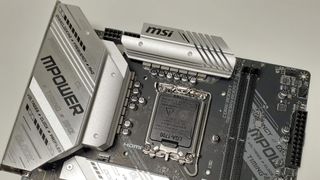39 million motherboards expected to be sold in 2024 — shipments recover to pre-pandemic levels
The PC market is finally bouncing back after six years.

The four biggest motherboard manufacturers, Asus, Gigabyte, MSI, and ASRock, will deliver 38.8 million motherboards in 2024. According to a DigiTimes report, the combined manufacturers will revive the PC market after the precarious drops in sales from 2020 through 2022 caused by the global pandemic.
The first drop in sales happened in 2020 when motherboard and GPU shipments hit a record low as the world shut down in March. In 2022, nearly three years after the start of the global lockdowns, the motherboard market saw an even more significant contraction, with sales falling by 10 million units — or a nearly 25% drop year-on-year.
However, the market has seemingly recovered the following year, with an estimated total delivery of nearly 37 million motherboards. The four big motherboard makers are also on track for record sales this year, with expected sales of 15 million units for Asus, 10.3 million for Gigabyte, 9.3 million for MSI, and 4.2 million for ASRock, totaling 38.8 million. The last time the motherboard market hit this number was in 2019, when the total sales hit 37.6 million units.
One factor that led to this recovery was China’s finally reopening its borders in 2023 after nearly three years of travel restrictions. Aside from this, the bevy of new desktop processors coming in 24H2 is also anticipated to push new motherboard sales. AMD’s Ryzen 9000-series desktop processors will hit store shelves on July 31, while Arrow Lake Intel chips are expected to arrive by October.
While AM5 motherboards will still support the Ryzen 9000 processors, AMD also announced X870 and X870E chipsets that extend USB 4.0 and PCIe 5.0 support. This will give Ryzen 9000 customers more reasons to upgrade their existing motherboards. On the other hand, the Intel Core Ultra 200 series processors will leverage the new LGA1851 socket, so motherboard manufacturers are preparing new 800-series motherboards for Intel’s next-generation processors.
Stay On the Cutting Edge: Get the Tom's Hardware Newsletter
Get Tom's Hardware's best news and in-depth reviews, straight to your inbox.

Jowi Morales is a tech enthusiast with years of experience working in the industry. He’s been writing with several tech publications since 2021, where he’s been interested in tech hardware and consumer electronics.
-
ThomasKinsley Two people I know just upgraded from a 10 and 14 year old PC, respectively. We've reached a point where a good computer can easily last 10 years, but I still remember the old days when a 3 year old machine was ancient and in dire need of an upgrade.Reply -
Pemalite Reply
This.ThomasKinsley said:Two people I know just upgraded from a 10 and 14 year old PC, respectively. We've reached a point where a good computer can easily last 10 years, but I still remember the old days when a 3 year old machine was ancient and in dire need of an upgrade.
I have a Ryzen 9 5950X which is 3 years old at this point... And I still don't see a reason to upgrade it yet. -
CmdrShepard I am not surprised -- Intel keeps changing sockets like dirty socks almost yearly now. You can't avoid changing mainboard if you want the latest CPU, and other stuff is being imrpvoed piecemeal (connectivity, standards, etc) -- it is basically a manufactured "need" to get a new mainboard.Reply -
ocer9999 Reply
Just not GPUs :PPemalite said:This.
I have a Ryzen 9 5950X which is 3 years old at this point... And I still don't see a reason to upgrade it yet.
Most Popular


